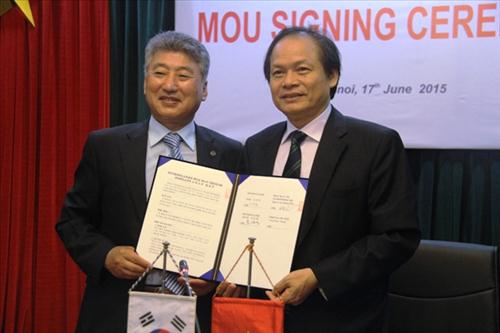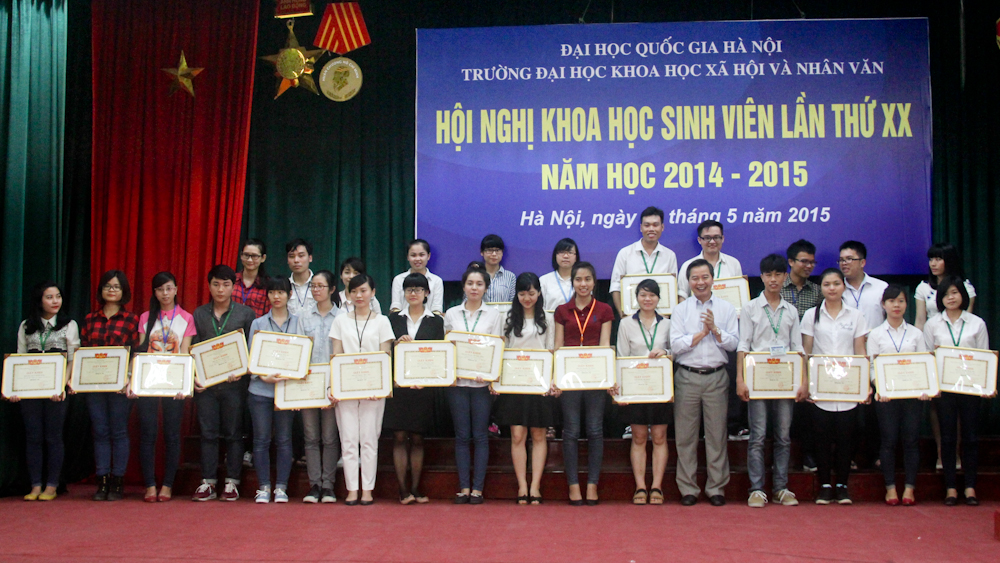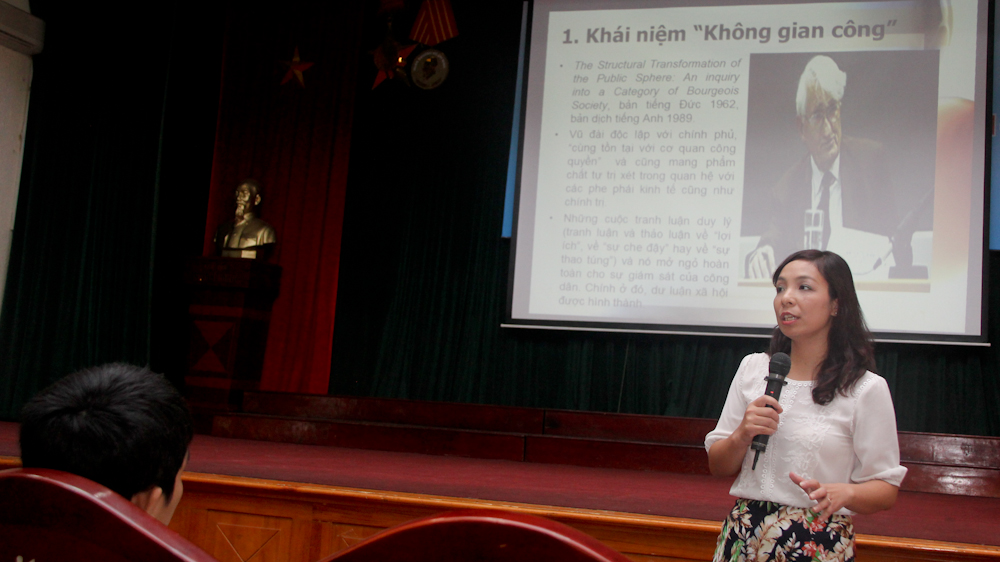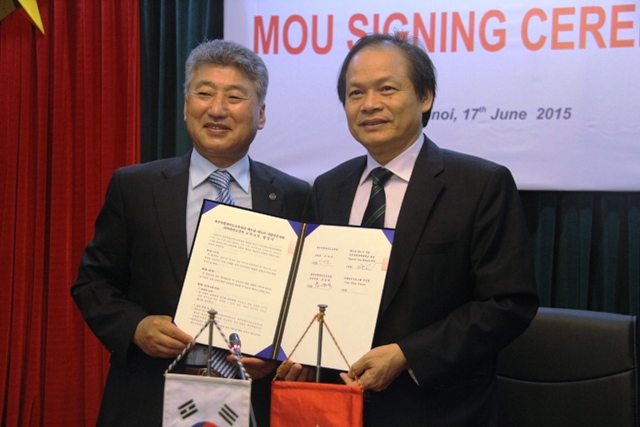

StudentThey lined up neatly in the auditorium on the 8th floor of building E, waiting for their turn to receive their diplomas.
Training is the honor and responsibility of the scientific community.
"Maintaining and further improving the quality of training is considered an honor and responsibility for a scientific community like the University of Social Sciences and Humanities.“Associate Professor Dr. Nguyen Van Kim, Secretary of the Party Committee and Vice Rector of the University, emphasized.
As a leading institution in the training of high-quality human resources, the School is aware of its pioneering role in training activities and strives for timely innovation in line with the general trends of global education and training, while maintaining quality as the guiding principle for all activities.
The school has completed the transition from a semester-based training system to a credit-based system at all levels. Learners are affirmed as the central figure in the training process, training management has become more flexible, and the articulation between different levels of education has been strongly promoted.
In the first four cohorts of the credit-based training program (from 2007 to 2010), 400 students graduated early, ranging from one semester to one academic year ahead of schedule. The on-time graduation rate was over 85%, and the rate of students graduating with a GPA of "good" or higher was over 90%.
"The university's credit-based training programs are always geared towards meeting market demands. In addition to knowledge and skills, students are also equipped with personal ethics, professional ethics, and social responsibility. Therefore, it can be said that graduates will possess a comprehensive competence, capable of meeting the requirements of the labor market."Associate Professor Tran Ngoc Lieu, Head of the Training Department of the University of Social Sciences and Humanities, shared."
Besides continuing to open new training programs to meet social needs, the Party Committee of the University also advocates for the development of more high-quality training programs, aiming for international standards, and expanding international joint training programs.
Dual degree programs are developed by combining existing programs within the University or by combining programs from member universities within the Vietnam National University, Hanoi.

The Student Scientific Research Conference is an annual event that attracts a large number of students from the university.
Currently, the University offers 21 undergraduate programs, 6 high-quality programs, and 129 dual degree programs. In 2014, the University completed the plan for the development of majors/specializations up to 2020, creating a scientific basis for the continued development of training majors and specializations over the next five years.
During the period 2010-2015, postgraduate training saw significant development in both scale and quality, especially in doctoral training and the training of international students. Each year, the university trained approximately 140 doctoral candidates, including about 20 international students. The proportion of postgraduate training to the total regular training was approximately 37%. This ratio is gradually approaching the standards of a research university. The number of international postgraduate students increased along with the expansion of many new training disciplines..
Over the past five years, the University has launched 11 additional postgraduate programs, bringing the total number of postgraduate programs to 61. It is projected that by 2020, the University will have 69 postgraduate programs.
Quality assurance in education is also a pioneering area for the University, and it has quickly demonstrated its effectiveness in training. In 2013, the University completed the evaluation of the Bachelor of Linguistics program according to AUN standards and prepared for the evaluation of the Oriental Studies program. This is a new and determined step aimed at opening up opportunities to achieve regional and international quality standards in the University's training activities in the near future.
In implementing the Party Committee's conclusions on reforming university governance, administrative reform, and applying ISO standards in management activities, the University has completed Phase 1 and is continuing to develop Phase 2 of its quality management system according to ISO standards. It is also promoting solutions to improve and upgrade its infrastructure.

PhD candidate Nguyen Thi Thuy Hang, from the Department of Political Science, is presenting her paper at the scientific conference for young staff and postgraduate students of the University.
Breakthroughs in the development of high-quality personnel.
Recognizing that high-quality, highly skilled human resources are a key strategic factor determining the development of a university, the Party Committee issued an important conclusion on strengthening the training and development of cadres towards achieving international standards. This conclusion has served as a guiding principle for the implementation of many positive policies, focusing on and demonstrating strong investment in the development of the workforce.
Professor Dr. Nguyen Van Khanh, the Rector of the school, shared:The Party Committee and the School's Board of Directors have always paid special attention to the training and development of young staff members. The school has implemented preferential policies ranging from reducing mandatory service hours to waiving tuition fees and providing financial support for master's and doctoral students who are staff members of the school.”
Currently, the University has over 100 young faculty members pursuing doctoral studies, and in the near future, there will be approximately the same number of young PhDs. This will be a crucial team, contributing to building a highly qualified faculty at the University of Social Sciences and Humanities, and helping to achieve the goal of high-quality training and research.
According to statistics, the current faculty of the University comprises 358 staff members, of which 95.5% hold postgraduate degrees. This includes 185 PhD holders (54.1% of postgraduate faculty), 96 Professors and Associate Professors (26.8% of total faculty), 103 faculty members pursuing doctoral studies, and 16 faculty members pursuing master's degrees. With this development of the faculty, the percentage of staff with postgraduate degrees and scientific titles has exceeded the target set by the 26th Party Congress of the University, and is an impressive figure for a university. This result also serves as a fundamental foundation for the University to achieve many successes in other areas of activity.

Professor Nguyen Van Khanh exchanged cooperation documents with Mr. Ko Dong Hyeon.Jeju Provincial Department of Education (South Korea)
Scientific research and international cooperation are becoming more in-depth.
With the goal of developing into a research-oriented university, the Party Committee of the University of Social Sciences and Humanities has determined that improving the quality of scientific research activities will be the basis for improving the quality of training, the quality of the faculty, and building the scientific reputation of the University.
The University's scientific research activities during the past term have seen remarkable development in both breadth and depth. A highlight of this activity is its effective participation in key national-level scientific programs. These research projects have provided scientific arguments for the development of socio-economic policies, the protection of border and maritime sovereignty, and other related areas.
The University's significant growth in scientific research activities is demonstrated by impressive figures over the past five years: 2,762 research results, including 188 international publications, and 21 science and technology awards at various levels, including 3 Ho Chi Minh Awards, 2 State-level awards, and 16 awards from the Vietnam National University, Hanoi and the Ministry.
Scientific conferences are also a strength of the University, helping to create a forum for exchange between scientists from both within and outside the country, sharing research and new insights on many scientific and current issues. To gradually approach international standards in scientific research, in recent years the University has implemented many solutions to support scientific publications in international journals. From only 7 international publications in 2011, by 2014, the number of international publications by the faculty had increased to over 40 works.
Under the guidance of the University Party Committee, the past five years have been a period of most brilliant development for the University's international cooperation activities. This has not only supported the elevation of training and research activities to an international level but also contributed to affirming the University's position as a leading representative of Vietnamese higher education. As a result, the University has attracted and diversified external resources for development. Notably, this activity has not only grown in scale but has also truly become more effective and in-depth.
Among the partners are many prestigious top-tier universities in the world, such as: Princeton University, University of San Jose, University of Utah, University of Tokyo, National University of Moscow, Nanyang University (Singapore), National Taiwan University, Shanghai University (China), University of Toulouse II, University of Paris II, Lund University (Sweden), Australian National University, Yonse University...
The success of the University of Social Sciences and Humanities over the past five years is due to the University Party Committee's effective work in political and ideological affairs, fostering consensus and cohesion throughout the Party Committee. Building the University into a high-quality, top-level training and research center has always been a steadfast goal and the highest objective for all development decisions and plans, despite numerous practical difficulties.
Author:USSH
Newer news
Older news